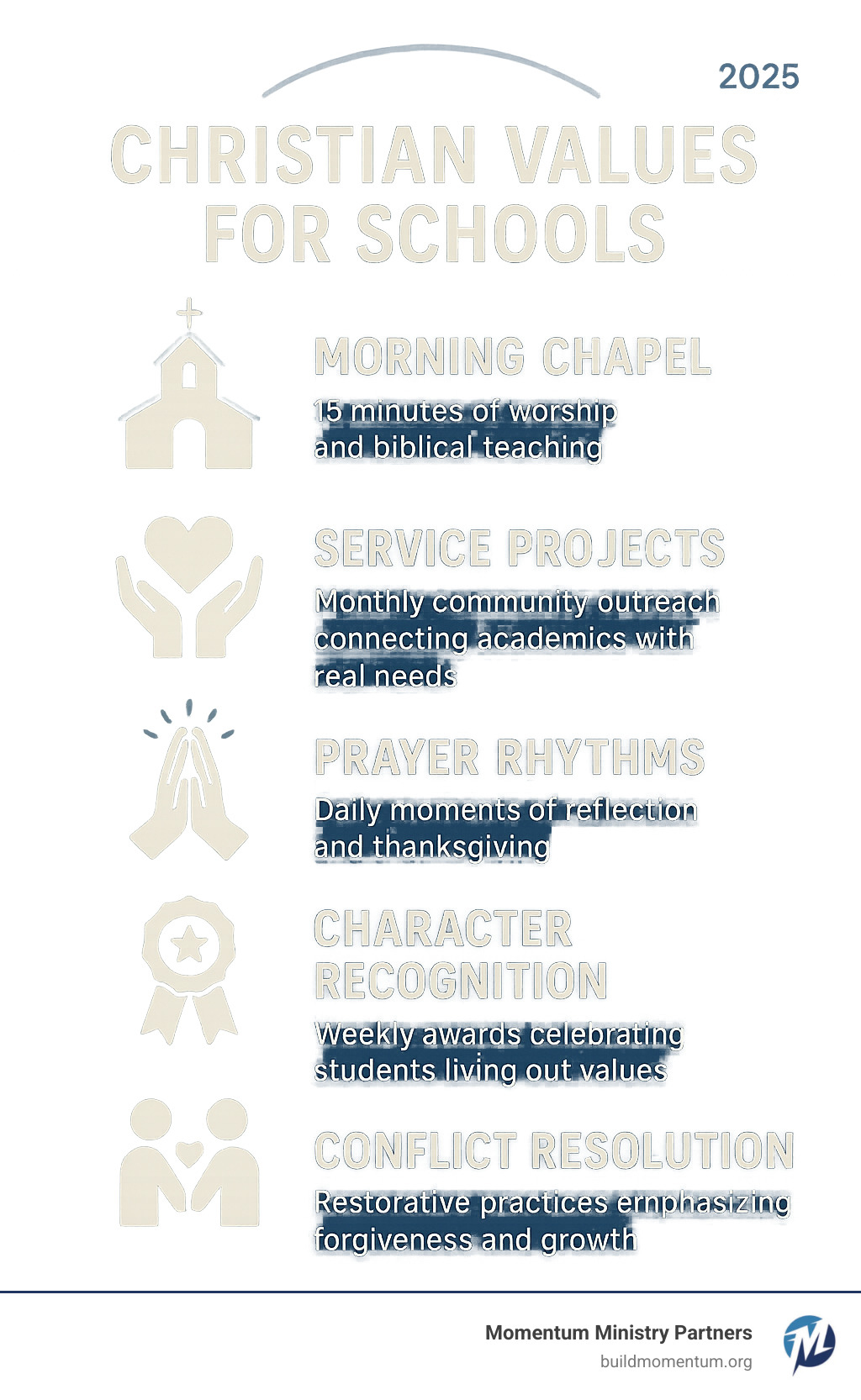Why Christian Values Transform Educational Environments
Christian values for schools create the foundation for developing well-rounded students who excel academically while growing in character and faith. These core principles guide everything from classroom interactions to campus culture, shaping young minds for lifelong success and service.
Essential Christian Values for Schools:
- Love and Compassion – Fostering empathy and kindness toward others
- Integrity and Honesty – Building trust through truthfulness and moral uprightness
- Respect and Humility – Honoring the dignity of every person
- Forgiveness and Reconciliation – Offering grace and healing broken relationships
- Perseverance and Diligence – Developing resilience and strong work ethic
- Service and Generosity – Focusing on others and giving back to the community
When schools accept these biblical principles, they create environments where students don’t just memorize facts – they develop the moral compass needed to steer life’s challenges with wisdom and purpose.
The research shows that faith-integrated education produces remarkable outcomes. Students learn to see their studies through a biblical worldview, connecting academic subjects to God’s truth. They develop stronger relationships, show greater resilience during difficulties, and demonstrate higher levels of compassion and service to others.
This holistic approach addresses every aspect of student development – spiritual, moral, social, and intellectual growth. Rather than compartmentalizing faith into a single class, these values become woven into the fabric of daily school life, from morning chapel to afternoon service projects.
I’m Jeff Bogue, and through over three decades of ministry leadership and my work with Momentum Ministry Partners, I’ve witnessed how christian values for schools transform not just individual students but entire communities. My passion lies in equipping the next generation of leaders with the biblical foundation they need to make a lasting Kingdom impact.

What Are the Core Christian Values for Schools?
Picture walking into a school where students genuinely care for one another, where honesty is celebrated, and where mistakes become stepping stones to growth. This is what happens when christian values for schools serve as the foundation of daily life.
These biblical principles don’t just decorate hallways—they shape hearts, guide choices, and prepare students to lead with wisdom and compassion.
Love and Compassion
Agape love is the deliberate choice to seek someone else’s good—even when it’s hard. By practicing the Golden Rule and reflecting on the Good Samaritan parable, students learn empathy that extends far beyond campus walls. “Compassion projects” such as food drives or nursing-home visits let them turn Scripture into action (core values list, spiritual growth tips).
Integrity and Honesty
Integrity forms the bedrock of trust. From refusing to cheat on tests to owning mistakes, students see in the story of Daniel in the lion’s den that truthfulness sometimes requires courage. Consistent honesty builds accountability and genuine self-respect.
Respect and Humility
Every person bears God’s image, so students practice valuing differences, listening well, and treating property with care. Philippians 2:3 calls them to humility—putting others first while maintaining self-respect.

Forgiveness and Reconciliation
Forgiveness is distinctly Christian. Inspired by the Prodigal Son, students learn to release resentment, repair relationships, and practice restorative conflict resolution that turns failures into growth moments.
Perseverance and Diligence
Like Noah steadily building the ark, students see challenges as opportunities to develop resilience and a growth mindset. Hard work offered to God fosters a lifetime of perseverance.
Service and Generosity
Following Jesus, who washed His disciples’ feet, students find that leadership starts with service. Regular community outreach and stewardship projects teach them to give time, talents, and resources generously.
Together, these six values create schools where students don’t just learn facts—they become compassionate, principled leaders ready to bless their communities.
Why a Values-Based Education Fosters Holistic Growth
When schools accept christian values for schools, students grow spiritually, emotionally, socially, and intellectually. This isn’t about adding a single Bible class—it’s about recognizing every learner as a whole person created by God.
Nurturing Spiritual and Moral Development
Daily exposure to biblical truth helps students build reliable moral compasses. They move beyond “What can I get away with?” to “What would Jesus do?” Personal faith becomes a genuine journey through prayer, worship, and finding purpose.

Enhancing Social and Emotional Well-being
Environments shaped by love, respect, and forgiveness lower anxiety and bullying while boosting belonging. Students learn conflict resolution rooted in grace, developing resilience that enables them to bounce back from setbacks and maintain healthy relationships.
The Link Between Christian Values and Academic Excellence
Diligence, integrity, and perseverance translate directly into stronger study habits. When students view all truth as God’s, learning becomes worship. A safe, respectful culture lets them focus on mastering material rather than navigating social drama.
Values-based education, then, isn’t a trade-off between faith and academics—it is the catalyst for both.
How to Weave Christian Values into the Fabric of a School
For values to transform a campus, they must saturate every conversation, policy, and lesson—much like seasoning blended through an entire meal.
The Crucial Role of Teachers and Staff
Teachers are the living curriculum. By responding to pressure with grace, mentoring students, and celebrating growth, they demonstrate authentic faith that lectures alone can’t match. Strong teacher-student relationships grounded in respect and appropriate boundaries create a nurturing atmosphere.

Integrating Values into the Curriculum
A biblical worldview connects every subject to God’s character. Science reveals His creativity, history shows the impact of faith, and literature explores moral themes. Parables, thematic units, and monthly character focuses weave faith naturally through academics.
Embedding Values in Daily School Life
Chapel, brief daily prayers, and service-learning projects turn belief into practice. Small discipleship groups offer deeper community, while kindness awards and restorative conflict protocols reinforce the behaviors a Christian school cherishes.

When every layer of school life points to Christ, students experience a cohesive, life-changing education.
Frequently Asked Questions about Christian Values in Education
How can a school teach Christian values without being indoctrinating?
The difference between teaching values and indoctrination lies in the approach and heart behind the education. Christian values for schools can be presented as character education that focuses on universal virtues like kindness, respect, and honesty – qualities that benefit every student regardless of their family’s faith background.
Effective Christian education presents biblical principles as a coherent worldview while encouraging students to explore, question, and personally reflect on these values. Rather than demanding blind acceptance, teachers facilitate meaningful discussions that help students understand the reasoning behind Christian values and find their practical benefits in daily life.
The goal is fostering moral autonomy within a faith-informed framework. Students learn to make thoughtful moral choices and engage respectfully with different perspectives, developing the critical thinking skills necessary for mature faith. This approach actually strengthens their ability to articulate and defend their beliefs.
Research shows that schools with a Christian ethos can promote student autonomy in religious matters while still providing solid character education. Students develop into young adults who can think critically about their faith and make informed decisions about their spiritual journey.
The beauty of this approach is that character traits like integrity, compassion, and perseverance benefit all students and prepare them for responsible citizenship and meaningful relationships, regardless of their future faith path.
Do Christian values improve academic outcomes?
Absolutely! Research consistently demonstrates that christian values for schools contribute to improved academic performance through multiple pathways. It’s not magic – it’s the natural result of creating environments where learning can flourish.
Values like diligence, integrity, and perseverance directly support the habits and attitudes necessary for academic success. When students develop strong work ethics through Christian character formation, they naturally approach their studies with greater focus and determination.
A positive and disciplined learning environment emerges naturally from Christian values. When students feel safe, respected, and purposeful, they can channel their energy into learning rather than navigating social conflicts or protecting themselves from bullying. This creates the ideal conditions where academic achievement can flourish.
The emphasis on integrity reduces cheating and plagiarism while encouraging authentic learning. Students develop intrinsic motivation to truly understand material rather than simply achieving high grades through shortcuts. This deeper engagement leads to better retention and application of knowledge that serves them well beyond graduation.
Students who have been shaped by Christian values learn to persist through difficult concepts, seek help when needed, and maintain high standards for their work. These habits become invaluable assets in higher education and professional careers, setting them up for long-term success.
What are the benefits for the wider community?
A values-based education produces graduates who are not just academically prepared but also morally grounded and service-oriented. These young people become the kind of citizens every community needs – responsible, ethical, and genuinely caring about others’ welfare.
Students formed by Christian values demonstrate higher levels of civic engagement, volunteer service, and ethical behavior in their professional lives. They approach leadership roles with servant hearts and make decisions based on moral principles rather than personal gain. This creates a ripple effect that strengthens entire communities.
The emphasis on service and generosity creates citizens who actively work to address community needs. These graduates often become leaders in charitable organizations, community improvement efforts, and social justice initiatives. Their faith motivates them to use their talents and resources for the common good rather than just personal advancement.
Stronger family relationships result from the character formation that occurs in Christian schools. Students learn vital communication skills, conflict resolution techniques, and the importance of commitment that serve them well in marriage and parenting. This creates a positive cycle that strengthens communities across generations.
When schools prioritize christian values for schools, they’re not just educating individual students – they’re investing in the future health and vitality of entire communities. These graduates become the teachers, business leaders, parents, and volunteers who make their communities better places to live.
Conclusion
When we look at the transformative power of christian values for schools, we see something beautiful happening – students aren’t just learning facts and figures, but developing into compassionate, resilient individuals who will make a real difference in the world. The six core values we’ve explored create the foundation for this remarkable change.
These biblical principles work together like threads in a mix, weaving love and compassion with integrity and honesty, respect and humility with forgiveness and reconciliation, and perseverance and diligence with service and generosity. When schools accept these values wholeheartedly, they create environments where students flourish in every area of their lives.
The importance of holistic development becomes crystal clear when we consider what our young people truly need. They need to master academic subjects and develop critical thinking skills. But they also need moral compasses that guide their decisions when no one’s watching, spiritual foundations that give their lives meaning and purpose, and character traits that enable them to contribute positively wherever they go.
Creating a positive culture through Christian values doesn’t happen overnight – it requires intentional effort from everyone involved. When administrators, teachers, students, and families work together to weave these principles into daily school life, something magical occurs. From morning chapel services to afternoon service projects, from curriculum design to conflict resolution, these values become the heartbeat of the school community.
The lasting impact on students extends far beyond graduation day. We’ve witnessed countless graduates who approach their careers with integrity, build marriages on biblical foundations, and raise children with strong moral character. They become the kind of leaders our communities desperately need – people who serve with humility, lead with wisdom, and make decisions based on what’s right rather than what’s easy.
Character formation that happens in Christian schools prepares students not just for college admissions or career success, but for lives of genuine significance. These young people understand that their talents and opportunities are gifts to be stewarded wisely. They approach their futures with confidence, knowing their identity is rooted in something far more solid than achievements or possessions.
Through our work at Momentum Ministry Partners, we’ve seen how these principles transform entire communities. When schools partner with local churches and families to provide comprehensive character formation, the ripple effects strengthen society as a whole. We’re passionate about equipping leaders who understand that christian values for schools aren’t just educational tools – they’re life-changing foundations.
A values-based education ultimately prepares students for a life of purpose and service that reaches far beyond personal success. These graduates become the teachers, doctors, business leaders, and yes, ministry leaders who shape the next generation. They carry forward the torch of biblical values, ensuring that these timeless principles continue to transform lives and communities.
The investment in Christian values education pays incredible dividends – not just in individual lives, but in the health and vitality of our churches, communities, and society. As we face increasingly complex challenges that require both competence and character, the need for leaders formed by biblical principles becomes more urgent than ever.
Discuss how Christian values meet modern culture with your youth group and explore how these timeless principles provide the guidance our young people need to steer contemporary challenges while remaining faithful to biblical truth.







0 Comments